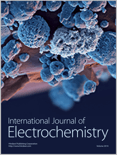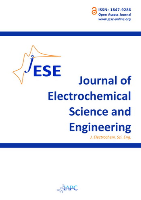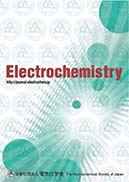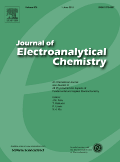
JOURNAL OF SOLID STATE ELECTROCHEMISTRY
Scope & Guideline
Unveiling the Science Behind Solid-State Innovations
Introduction
Aims and Scopes
- Solid-State Electrochemistry:
Research on the electrochemical properties and behaviors of solid-state materials, particularly in relation to energy storage devices like batteries and supercapacitors. - Electrode Materials Development:
Innovative synthesis and characterization of advanced electrode materials for applications in lithium-ion batteries, sodium-ion batteries, and supercapacitors. - Electrochemical Sensors:
Development of novel electrochemical sensors for environmental monitoring, health diagnostics, and food safety, utilizing various nanomaterials and composite materials. - Photoelectrochemical Applications:
Studies focused on photoelectrochemical processes, including water splitting for hydrogen production and dye-sensitized solar cells, emphasizing the integration of light-absorbing materials. - Corrosion Science:
Investigation into the electrochemical mechanisms of corrosion and the development of corrosion-resistant materials and coatings. - Electrochemical Energy Conversion:
Research on electrochemical systems for energy conversion processes, including fuel cells and electrolysis, aimed at improving efficiency and sustainability. - Computational Electrochemistry:
Utilization of computational methods to model and predict the electrochemical behavior of materials, aiding in the design of better electrochemical systems. - Environmental Electrochemistry:
Application of electrochemical methods for environmental remediation, including waste treatment and pollutant detection.
Trending and Emerging
- Nanostructured Materials for Energy Storage:
There is an increasing focus on the development and application of nanostructured materials, such as graphene and transition metal oxides, for enhancing the performance of batteries and supercapacitors. - Sustainable and Green Chemistry:
Research on environmentally friendly materials and processes, including the use of bio-derived materials and green synthesis methods, is becoming more prominent, aligning with global sustainability goals. - Hybrid Energy Storage Systems:
The exploration of hybrid systems that combine features of batteries and supercapacitors to achieve higher energy and power densities is gaining traction. - Solid-State Electrolytes:
A significant trend is the development of solid-state electrolytes for lithium-ion and sodium-ion batteries, focusing on improving safety and performance compared to liquid electrolytes. - Electrochemical Water Splitting:
Research on photoelectrochemical water splitting for hydrogen production is on the rise, driven by the quest for sustainable energy solutions. - Electrochemical Biosensors:
The field of biosensing is rapidly expanding, with a growing number of studies focusing on the development of electrochemical biosensors for medical diagnostics and environmental monitoring. - Computational and Theoretical Approaches:
The use of computational methods for predicting and modeling electrochemical behaviors and materials properties is increasingly prevalent, supporting experimental research. - Advanced Characterization Techniques:
Emerging techniques for material characterization, including in situ and operando methods, are becoming more common, allowing for better understanding of electrochemical processes.
Declining or Waning
- Traditional Battery Technologies:
Research on conventional battery technologies, such as lead-acid and nickel-cadmium batteries, appears to be waning in favor of more advanced materials and chemistries like lithium-ion and sodium-ion systems. - Basic Electrochemical Theory:
Papers centered solely on fundamental electrochemical theory without direct application or innovation have decreased. The journal is shifting towards applied research that has practical implications. - Corrosion Protection Coatings:
While corrosion science is still relevant, the specific focus on traditional protective coatings has diminished in favor of more innovative materials and methods, such as nanocomposites and hybrid systems. - Classic Voltammetric Techniques:
The use of classical voltammetric methods in isolation has seen a decline. There is a growing trend towards integrating these methods with advanced materials and multi-functional approaches. - Electrochemical Education:
While educational perspectives remain important, the volume of articles focusing on traditional electrochemical education practices has decreased, possibly due to a shift towards more technologically integrated teaching methods.
Similar Journals

SURFACE ENGINEERING AND APPLIED ELECTROCHEMISTRY
Exploring Innovations in Surface Engineering and ElectrochemistrySURFACE ENGINEERING AND APPLIED ELECTROCHEMISTRY, published by PLEIADES PUBLISHING INC, stands as a pivotal resource in the realms of engineering and materials science. With an ISSN of 1068-3755 and an E-ISSN of 1934-8002, this journal encompasses an extensive scope that includes industrial applications, and innovative surface treatments, fostering advancements in the fields of Industrial and Manufacturing Engineering, Surfaces, Coatings and Films, and Surfaces and Interfaces. Recognized for its contributions, it currently holds a Q3 classification in both Industrial and Manufacturing Engineering and Surfaces, Coatings and Films, alongside a Q4 ranking in Surfaces and Interfaces for the year 2023. Despite its competitive standings, the journal encourages inclusive dialogue and dissemination of research from a global community—making it an essential platform for researchers and professionals dedicated to surface technologies and applied electrochemistry. Potential contributors and readers can expect a comprehensive exploration of techniques and innovations, reinforcing the journal's commitment to bridging theory and practical application in these dynamic fields.

Electrochemical Science Advances
Advancing Knowledge in ElectrochemistryElectrochemical Science Advances, published by WILEY, is an esteemed Open Access journal that has been making significant contributions to the field of electrochemistry since its inception in 2021. With an ISSN of 2698-5977, this journal serves as a vital platform for researchers and practitioners looking to disseminate their findings on a diverse range of topics within the electrochemical sciences and related areas. The journal has achieved commendable rankings in the Scopus database, placing it in the 2nd quartile in Chemistry (miscellaneous) and the 3rd quartile in Electrochemistry, highlighting its relevance and growing influence in the academic community. As it converges from 2021 to 2024, Electrochemical Science Advances aims to foster collaboration and innovation, offering a vital resource for students, professionals, and researchers dedicated to advancing knowledge and technology in electrochemistry. Access to this cutting-edge research is straightforward, allowing for a comprehensive engagement with the latest advances in the field.

International Journal of Electrochemistry
Exploring the synergy of science and innovation in electrochemistry.The International Journal of Electrochemistry, published by HINDAWI LTD, serves as a premier outlet for cutting-edge research in the expansive field of electrochemistry. With an ISSN of 2090-3529 and an E-ISSN of 2090-3537, this open-access journal has been contributing to the advancement of scientific knowledge since 2011, making its content freely available to researchers, industry professionals, and students around the globe. The journal aims to foster innovation by disseminating high-quality research articles, reviews, and technical notes that encompass a wide range of topics from fundamental electrochemical principles to practical applications in energy storage, sensors, and material development. With a focus on promoting interdisciplinary collaboration and advancing the understanding of electrochemical systems, the International Journal of Electrochemistry is a vital resource for anyone involved in electrochemical research and its applications.

Journal of Electrochemical Science and Engineering
Empowering Global Collaboration in Electrochemical Science.The Journal of Electrochemical Science and Engineering, published by the International Association of Physical Chemists (IAPC), serves as a vital resource for researchers and professionals in the fields of electrochemistry, materials chemistry, and chemical engineering. With an Open Access model since 2011, this journal ensures that groundbreaking research is freely accessible to a global audience, promoting collaboration and knowledge sharing. Situated in Croatia, it showcases cutting-edge developments while focusing on applied aspects related to electrochemical technologies. Notably, the journal holds a commendable Scopus ranking, placing it within the Q3 quartile for multiple categories, including Chemical Engineering (miscellaneous) and Electrochemistry. By fostering innovative research and comprehensive reviews, the Journal of Electrochemical Science and Engineering plays a crucial role in advancing the understanding and application of electrochemical processes, making it an indispensable platform for academics and practitioners alike.

JOURNAL OF THE ELECTROCHEMICAL SOCIETY
Charting New Territories in Electrochemical Research Since 1948JOURNAL OF THE ELECTROCHEMICAL SOCIETY, published by the ELECTROCHEMICAL SOCIETY INC, is a leading peer-reviewed academic journal dedicated to advancing the field of electrochemistry and its myriad applications. With an ISSN of 0013-4651 and E-ISSN of 1945-7111, this esteemed journal has been a pivotal platform for research since its inception in 1948, with convergence periods allowing for a rich historical context of study through to 2024. Recognized for its high impact, it holds a noteworthy Q1 ranking in several categories including Condensed Matter Physics and Materials Chemistry, and it is Q2 ranked in both Electrochemistry and Renewable Energy. This journal features a range of articles that encompass both theoretical and experimental advancements, making it a crucial resource for researchers, professionals, and students keen on exploring cutting-edge developments in materials science, energy solutions, and sustainable technologies. Although it is not an open access journal, its rigorous standards ensure that published work significantly contributes to the body of knowledge within its fields, fostering innovative research and collaborative progress.

ELECTROCHEMISTRY
Connecting Global Minds in Electrochemical TechnologyELECTROCHEMISTRY is an esteemed journal published by the Electrochemical Society of Japan, dedicated to advancing the field of electrochemical science and technology. With an ISSN of 1344-3542 and an E-ISSN of 2186-2451, this journal has been providing a platform for scholarly communication since its inception in 1996, with a converged scope extending to 2024. As an Open Access publication since 2020, it facilitates the wide dissemination of research, fostering collaboration among researchers, professionals, and students alike. Currently positioned in Q3 of the electrochemistry category and ranking 52 out of 60 in Scopus, ELECTROCHEMISTRY is committed to publishing high-quality, peer-reviewed articles that explore novel electrochemical systems, applications, and methodologies. With its base in Tokyo, Japan, the journal serves a global audience, promoting cutting-edge research that drives innovation in energy, materials science, and analytical chemistry.

Journal of Electroanalytical Chemistry
Driving Discoveries in Analytical Chemistry and BeyondThe Journal of Electroanalytical Chemistry, published by Elsevier Science SA, stands as a leading platform for the dissemination of cutting-edge research in the field of electroanalytical science. With an impressive impact factor that reflects its esteemed reputation—ranking in the Q1 category for both Analytical Chemistry and Chemical Engineering, alongside a strong presence in Electrochemistry—this journal provides a vital resource for researchers, professionals, and students alike. Covering topics from fundamental electrochemical processes to innovative analytical techniques, the journal aims to foster an in-depth understanding and discussion of contemporary advancements in electroanalytical methodologies. Operating under a model that prioritizes quality and rigor, it facilitates access to high-quality manuscripts and reviews that contribute to the advancement of the field. For over six decades, from 1959 to 2024, it has played an intrinsic role in shaping the landscape of electrochemistry, continually driving forward the frontiers of knowledge and application.

Electrochemical Energy Reviews
Exploring the Frontiers of Electrochemical ResearchElectrochemical Energy Reviews, published by SpringerNature, serves as an essential platform for the dissemination of cutting-edge research in the fields of electrochemistry, material science, and energy engineering. With an impressive impact factor and ranked in the Q1 category across multiple disciplines including Chemical Engineering and Energy Technology, this journal highlights its commitment to advancing knowledge and innovation within the energy sector. Operating since 2018, the journal not only provides a valuable resource for researchers and professionals but also invites contributions from students and emerging scholars interested in the pivotal role of electrochemical processes in sustainable energy solutions. Published in Germany and widely accessible to the global research community, Electrochemical Energy Reviews is an indispensable reference for those keen on exploring the future of energy technologies.

Journal of the Korean Electrochemical Society
Fostering Excellence in Electrochemical Research and ApplicationsJournal of the Korean Electrochemical Society (ISSN: 1229-1935, E-ISSN: 1229-1935) stands as a prominent publication in the rapidly evolving field of electrochemistry. Published by the prestigious Korean Electrochemical Society, this journal serves as a vital platform for researchers, professionals, and students eager to disseminate and access cutting-edge studies related to electrochemical processes, materials, and technologies. With an emphasis on promoting innovative research and practical applications, the journal aims to foster collaboration and knowledge exchange within the global electrochemistry community. Although not an open access journal, it provides comprehensive and rigorous peer-reviewed content that ensures the highest scientific quality, making it a valuable resource for anyone involved in the field. Located in Seoul, South Korea, it continues to contribute significantly to the advancement of electrochemical sciences, addressing key challenges and developments that shape the future of technology and environmental sustainability.

Analytical & Bioanalytical Electrochemistry
Unleashing Insights in Analytical and Bioanalytical ScienceAnalytical & Bioanalytical Electrochemistry is a pivotal journal dedicated to the advancement of research and innovation in the fields of analytical chemistry and electrochemistry. Published by the University of Tehran, Faculty of Chemistry, Center of Excellence in Electrochemistry, this journal has been contributing to the scientific community since its inception in 2009 and continues to be a critical platform through 2024. With an ISSN of 2008-4226, it focuses on a variety of topics including electrochemical sensors, bioanalytical techniques, and innovative methodologies in electrochemical analysis. Although it currently holds a Q4 quartile ranking in both analytical chemistry and electrochemistry categories, its unique insights and research findings are essential for advancing knowledge and fostering interdisciplinary collaboration within the scientific community. Researchers, professionals, and students engaged in these dynamic fields will find valuable resources and contribute to the ongoing discourse by publishing their work in this journal. We invite you to explore and engage with the diverse content that Analytical & Bioanalytical Electrochemistry offers to enhance your research and professional development.